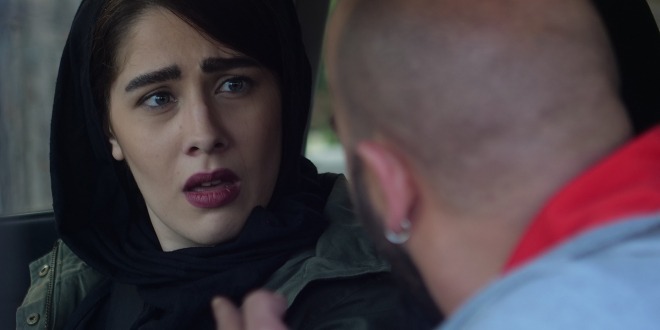Farbod Arebili’s short film Forbidden To See Us Scream In Tehran focuses on an Iranian woman who plans to change things by organizing an underground concert. This topical film which sheds light on the reality of banned western music in Iran which was put in place in 1979, Iranian women not being allowed to sing or perform publicly and live concerts being banned for female solo singers, has screened at a variety of film festivals including the Oscar qualifying Cleveland International Film Festival.
Farbod, You were born and raised in Tehran/Iran where you started an Underground Metal Band. Tell us your backstory.
Before anything, thank you so much for having me. Yes, when I was still living in Tehran, I started an underground Metal band named “OFF” with my friends. Of course, we were not allowed to release our albums in Iran officially, but we secretly distributed our CDs and released our music on the Internet. I never got to know how big our band really got to be because there were no album/ticket sales. But I have some fond memories of random encounters with people who were fans of our music without knowing that I was the musician.
Why was this story, “Forbidden to See Us Scream in Tehran” important to tell?
This is the story of the voiceless. Now that I am here in the US, now that I am lucky enough to have a voice, I feel obliged to be the voice of my exceptionally talented friends in Iran who are not allowed to share their art and dreams with the world.
How does your film, highlight the current situation of Iranian women prohibited from singing and performing?
This story is inspired by a female vocalist in our band in Iran. For our second album, we had an amazingly talented singer named “Ana.” Her voice was breathtaking, and it was always a struggle for me to understand why she was not allowed to sing in her own country legally. Singing solo for women is illegal in Iran in any genre, let alone metal. This film is a reimagination of her situation and the situation of so many like her.
What surprises you the most about Tehran today?
The spirit of people. Currently, living in Iran/Tehran is extremely hard. Our currency has completely lost its value, and the last time people went to the streets to protest, the government silenced them harshly. But as far as I can tell, people have not lost hope. They are still working hard and striving for a better tomorrow.
Take us through the film…
Without giving much away, the film follows the female lead singer of an Iranian death metal band who risks everything as she plots to call the cops on her own underground concert in the hopes that the raid will help her secure her asylum in another country.
Do you have a favorite scene?
I have a few, but my favorite is probably the film’s first scene, maybe because it was one of the riskiest scenes that we shot since it was set in a street. But my fantastic cast and crew soldiered on and courageously shot the scene exactly as it was planned.
What is your mission with your film?
One of my personal reasons for making this film was to raise awareness of the situation in Iran because I believe that being aware of a problem is the first step toward resolving it. However, now the film has a life of its own, and it’s not in my power anymore to determine its mission, so we’ll see.
Share your upcoming projects.
I just finished another short film very recently, a sci-fi passion project, and I’m preparing to make my first official feature film next year, which very well may be the feature version of “Forbidden to See Us Scream in Tehran.”
Please share your social media.
https://www.farbodardebili.com/
Vimeo.com/farboda
instagram.com/anarchy.stains/
https://vimeo.com/463019140/115c743a70

